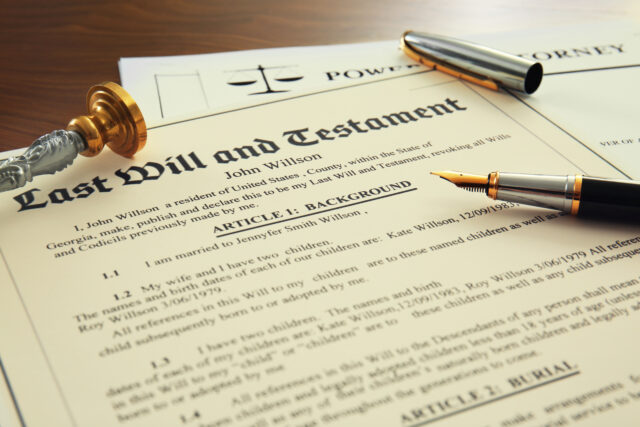What is the Difference Between a Living Trust and a Revocable Trust?
Middlesex County Will Lawyer

Writing a will is an essential component of crafting a comprehensive estate plan. In your will, you can primarily include provisions for who will inherit certain assets upon your passing, but this isn’t the only function it serves; you can also establish guardianships for loved ones, funeral instructions, and much more. Continue reading and reach out to a knowledgeable Middlesex County, Massachusetts estate planning lawyer from Mark Liam Gannon, Attorney at Law, for assistance drafting or updating your will.
Do I Need a Lawyer to Write My Will?
While there are countless online will-writing tools and DIY kits available, these generic solutions often fall short when it comes to ensuring your will is legally sound and tailored to your unique circumstances. In Massachusetts, a poorly drafted or improperly executed will can lead to confusion, disputes among heirs, and even litigation that could tie up your estate for years. Just some of the reasons why you should hire a lawyer to draft your will are as follows:
- An experienced estate planning attorney ensures your will complies with Massachusetts law and is structured in a way that clearly expresses your intentions.
- DIY wills frequently contain ambiguous language, fail to account for all assets, or do not meet formal legal requirements, all of which can render a will invalid or trigger costly disputes.
- If you own a business, have minor children, are in a blended family, or wish to disinherit someone, your needs go beyond the scope of generic templates.
- Proper execution is vital. An attorney ensures your will is signed and witnessed according to Massachusetts law, which is crucial to its enforceability.
Ultimately, while a DIY will may seem convenient, the peace of mind that comes with a professionally prepared document is invaluable, both for you and for the loved ones you leave behind.
What Can I Include in a Will?
A will serves as your voice after you are gone, guiding how your estate should be handled and providing clear instructions to those you leave behind. A well-crafted will can include a wide range of provisions tailored to your personal wishes and circumstances, including the following:
- Distribution of Assets: Specify who should receive your property, from real estate and bank accounts to personal belongings and family heirlooms.
- Beneficiaries: Name individuals or organizations who will inherit from your estate. This can include family members, friends, and charitable causes.
- Executor Appointment: Designate a trusted individual to serve as executor (also known as a personal representative), who will be responsible for administering your estate according to your instructions.
- Guardianship of Minor Children: Appoint a guardian to care for any minor children, a critical provision for parents who want to ensure their children are raised by someone they trust.
- Trust Provisions: Establish testamentary trusts to manage the inheritance of minor children or beneficiaries with special needs, or to achieve tax or asset protection goals.
- Debts and Expenses: Specify how debts and final expenses, including funeral costs, should be paid from your estate.
- Funeral and Burial Instructions: Although not legally binding, including preferences for your funeral or burial arrangements in your will can help guide your loved ones during a difficult time.
Each provision in your will can be customized to reflect your specific wishes and needs. A lawyer can help ensure that your will is comprehensive, unambiguous, and aligned with your overall estate planning goals.
What Makes a Will Valid & Enforceable in Massachusetts?
To ensure your will is recognized and upheld by Massachusetts probate courts, it must meet specific legal requirements. A valid and enforceable will must:
- Be Made by a Person of Legal Age: The testator (person making the will) must be at least 18 years old.
- Be Made Voluntarily and with Capacity: The testator must be of sound mind and acting of their own free will, without coercion or undue influence.
- Be in Writing: Oral wills are not recognized under Massachusetts law. The will must be a written document.
- Be Signed by the Testator: The testator must sign the will, or direct someone else to sign it on their behalf in their conscious presence.
- Be Witnessed Properly: The will must be signed in the presence of at least two competent witnesses, who also sign the document in the presence of the testator.
- Include a Clear Intent: The document must clearly indicate that it is intended to serve as the testator’s final will and testament.
- Avoid Alterations After Signing: Any changes made after the will is executed must follow proper legal procedures, such as creating a codicil or drafting a new will, and must also be properly witnessed.
- Comply with State Law Formalities: Massachusetts has adopted the Uniform Probate Code (UPC), and wills must comply with its provisions to be valid and enforceable.
Failing to meet these requirements could result in your will being challenged or disregarded during probate, potentially leaving your estate subject to intestacy laws. Working with an attorney helps ensure your will is drafted and executed properly the first time, minimizing the risk of disputes.
Contact a Tyngsboro, Massachusetts Will Writing Lawyer
Don’t run the risk of trying to draft your will on your own–hire a knowledgeable and dedicated estate planning lawyer who can ensure everything is done correctly and according to your wishes. Contact Mark Liam Gannon, Attorney at Law, for an initial consultation today.
© 2026 Mark Liam Gannon, Attorney at Law.
All rights reserved. Attorney advertising.


